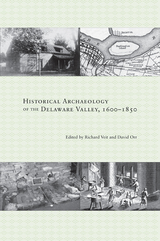2 books about Delaware Valley

Historical Archaeology of the Delaware Valley, 1600-1850
Richard Veit
University of Tennessee Press, 2013
The Delaware Valley is a distinct region situated within the Middle Atlantic states, encompassing portions of Delaware, Pennsylvania, New Jersey, and Maryland. With its cultural epicenter of Philadelphia, its surrounding bays and ports within Maryland and Delaware, and its conglomerate population of European settlers, Native Americans, and enslaved Africans, the Delaware Valley was one of the great cultural hearths of early America. The region felt the full brunt of the American Revolution, briefly served as the national capital in the post-Revolutionary period, and sheltered burgeoning industries amidst the growing pains of a young nation. Yet, despite these distinctions, the Delaware Valley has received less scholarly treatment than its colonial equals in New England and the Chesapeake region.
In Historical Archaeology of the Delaware Valley, 1600–1850, Richard Veit and David Orr bring together fifteen essays that represent the wide range of cultures, experiences, and industries that make this region distinctly American in its diversity. From historic-period American Indians living in a rapidly changing world to an archaeological portrait of Benjamin Franklin, from an eighteenth-century shipwreck to the archaeology of Quakerism, this volume highlights the vast array of research being conducted throughout the region. Many of these sites discussed are the locations of ongoing excavations, and archaeologists and historians alike continue to debate the region’s multifaceted identity.
The archaeological stories found within Historical Archeology of the Delaware Valley, 1600–1850 reflect the amalgamated heritage that many American regions experienced, though the Delaware Valley certainly exemplifies a richer experience than most: it even boasts the palatial home of a king (Joseph Bonaparte, elder brother of Napoleon and former King of Naples and Spain). This work, thoroughly based on careful archaeological examination, tells the stories of earlier generations in the Delaware Valley and makes the case that New England and the Chesapeake are not the only cultural centers of colonial America.
In Historical Archaeology of the Delaware Valley, 1600–1850, Richard Veit and David Orr bring together fifteen essays that represent the wide range of cultures, experiences, and industries that make this region distinctly American in its diversity. From historic-period American Indians living in a rapidly changing world to an archaeological portrait of Benjamin Franklin, from an eighteenth-century shipwreck to the archaeology of Quakerism, this volume highlights the vast array of research being conducted throughout the region. Many of these sites discussed are the locations of ongoing excavations, and archaeologists and historians alike continue to debate the region’s multifaceted identity.
The archaeological stories found within Historical Archeology of the Delaware Valley, 1600–1850 reflect the amalgamated heritage that many American regions experienced, though the Delaware Valley certainly exemplifies a richer experience than most: it even boasts the palatial home of a king (Joseph Bonaparte, elder brother of Napoleon and former King of Naples and Spain). This work, thoroughly based on careful archaeological examination, tells the stories of earlier generations in the Delaware Valley and makes the case that New England and the Chesapeake are not the only cultural centers of colonial America.
[more]

Of "Good Laws" and "Good Men"
Law and Society in the Delaware Valley, 1680-1710
William M. Offutt, Jr.
University of Illinois Press, 1995
William Offutt, Jr., places legal processes at the center of this regions social history. The new societies established there in the late 1600s did not rely on religious conformity, culture, or a simple majority to develop successfully, Offutt maintains. Rather, they succeeded because of the implementation of reforms that gave the expanding population faith in the legitimacy of legal processes implemented by a Quaker elite. Offutt's painstaking investigation of the records of more than 2,000 civil and 1,100 criminal cases in four county courts over a thirty-year period shows that Quakers--the "Good Men"--were disproportionately represented as justices, officers, and jurors in this system of "Good Laws" they had established, and that they fared better than did the rest of the population in dealing with it.
[more]
READERS
Browse our collection.
PUBLISHERS
See BiblioVault's publisher services.
STUDENT SERVICES
Files for college accessibility offices.
UChicago Accessibility Resources
home | accessibility | search | about | contact us
BiblioVault ® 2001 - 2024
The University of Chicago Press









